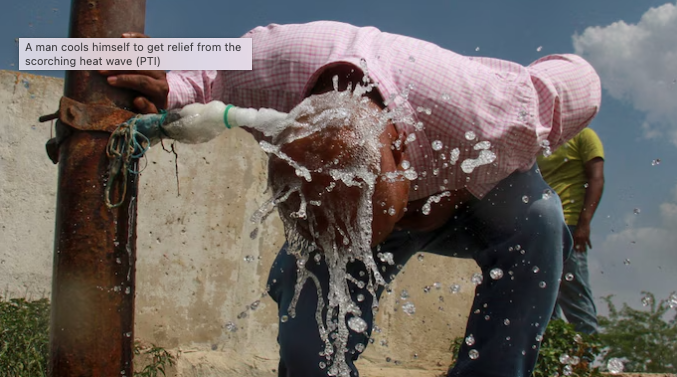Five people have died in the Indian capital Delhi in the past 72 hours due to extreme heat, as India grapples with one of its worst heatwaves in decades.

According to India Today, the Indian Meteorological Department (IMD) said that the capital city of Delhi recorded a daytime temperature of 51 degrees Celsius on June 18. The average maximum temperature remained around 45 degrees Celsius, 6 degrees Celsius higher than the normal temperature in June. The exceptionally high daytime temperature made the night air still hot and stuffy, pushing people into a state of continuous discomfort for a long time.
Apart from Delhi, temperatures soaring above 46 degrees Celsius were recorded across the north, including in Uttarakhand, Bihar and Jharkhand. In Bihar, 22 people died due to extreme heat and humidity in 24 hours.
The intense heatwave has prompted the IMD to issue a red alert for the areas, its highest level warning that high temperatures pose a risk to human health.
“I have lived in Delhi all my life, through many summers, but this year, the 15-minute walk outside is really haunting. It is 10 pm but the temperature is still 41 degrees Celsius, while it has been hot all day,” said an elderly resident.
Meanwhile, a social media account named Lukewarm shared that at 6:30 a.m., despite having been out all night, her tap water was still hot.
“Even the air conditioners are not working, the refrigerators are not cooling. This is the first time in 20 years that I have witnessed such a terrible heat wave in Delhi,” Lukewarm wrote.
Many residents also complained about not having the air conditioner on, when the outside temperature was still 45 degrees at 9pm.
Amid the extreme heat, Delhi’s peak electricity demand on the afternoon of June 18 hit an all-time high for the city. Officials said the cooling load due to increased use of air conditioners and other cooling devices amid the relentless heat had pushed up the demand for electricity to a record high.
The extreme temperatures are not only uncomfortable but also raise health concerns for residents and push the city's medical infrastructure to the brink of collapse.
Hospitals in Delhi have seen a surge in patients suffering from symptoms of heat stroke and exhaustion as temperatures continue to soar. Doctors have advised the elderly, children and immunocompromised patients to avoid going out in the heat. IMD officials said the high average temperatures and persistent nighttime temperatures are exacerbating the effects of the deadly heatwave.
High temperatures at night are considered one of the most dangerous factors for human life because the body does not have a chance to cool down. Increased nighttime temperatures are common in cities due to the urban heat island effect, in which urban areas are significantly hotter than surrounding areas.
“It is really worrying. Night temperatures in cities are not coming down. People are not getting a chance to recover, which means we will have more deaths at night than during the day, because normally the minimum temperature would come down and you would be able to recover and go back to work the next day. Now we are not able to do that,” environmentalist Sunita Narain told news agency PTI.